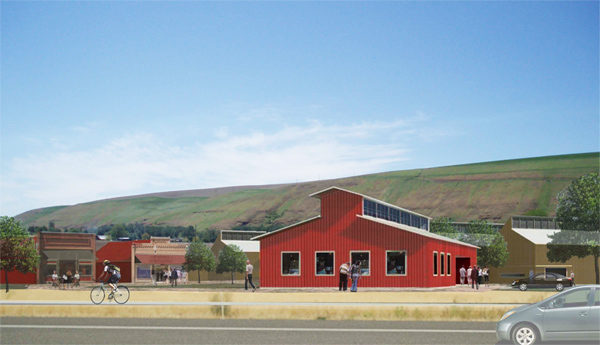Dayton, WA—In the sprawling hills and forests of Washington state, a new type of business will soon appear: an eco-friendly food park named Blue Mountain Station will be constructed near the town of Dayton in Columbia County. According to www.bluemountainstation.com, it is “the world’s very first destination eco-food processing park dedicated to the recruitment and marketing of artisan food processors, primarily in the natural and organic sectors focusing on local produce, artisan culinary retailers, etc.”
 Likened to finance in New York City and entertainment in California, Blue Mountain Station will become a beacon in the northwest, as eco-food tourism gears up as a hobby in the United States. Television programs like Top Chef have sparked interest in the culinary arts, especially how it relates to locally grown, organic food. Blue Mountain Station will emphasize this idea and make it accessible to travelers in the region. Jennie Dickinson, manager at the Port of Columbia, told WholeFoods, “Culinary tourism is a growing industry, as are natural and organic food production. While neither of these is unique in and of itself, the way we are pairing them is. Visitors to Blue Mountain can experience food production in the middle of farm country. We hope it will influence more people to think about the source of their food, and care about the sustainability of how things are being grown, processed and transported.”
Likened to finance in New York City and entertainment in California, Blue Mountain Station will become a beacon in the northwest, as eco-food tourism gears up as a hobby in the United States. Television programs like Top Chef have sparked interest in the culinary arts, especially how it relates to locally grown, organic food. Blue Mountain Station will emphasize this idea and make it accessible to travelers in the region. Jennie Dickinson, manager at the Port of Columbia, told WholeFoods, “Culinary tourism is a growing industry, as are natural and organic food production. While neither of these is unique in and of itself, the way we are pairing them is. Visitors to Blue Mountain can experience food production in the middle of farm country. We hope it will influence more people to think about the source of their food, and care about the sustainability of how things are being grown, processed and transported.”
The Station sparks a new type of business: those that stir economic vitality and job growth while embracing the simplicity already offered to us by nature. Dickinson lists some of the eco-friendly goals for Blue Mountain: buildings will be LEED certified, rainwater will be collected and reused, pervious pavement will be used for parking lots, renewable energy will be generated on site and employees can walk or bike to work easily.
Dayton has been a rural, agrarian community since the 1800s and organic agriculture is nothing new to the region. Dickinson says, “Blue Mountain Station is really a return to our past…with a sharper eye on how we can remain sustainable into the future.”
Published in WholeFoods Magazine, Feb. 2010










